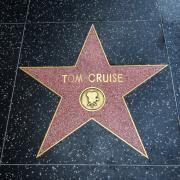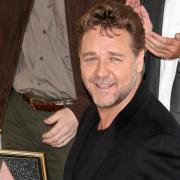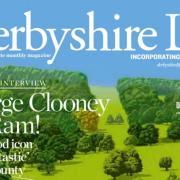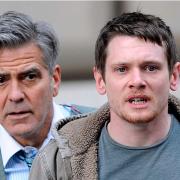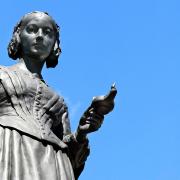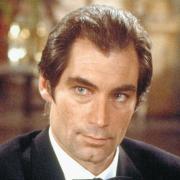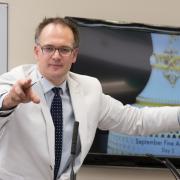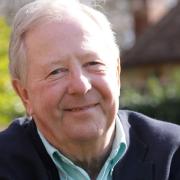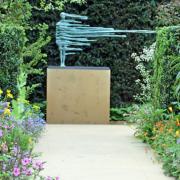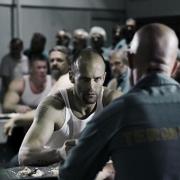Ashley Franklin talks to Mike Ingham – one of radio's best recognised football voices – about his Derby schooldays, football and recent MBE
Reflecting on this year is likely to wring a despondent sigh from any England football fan. At the 2010 World Cup, the Beautiful Game was nothing of the sort – right from England’s very first game against the USA.
However, I had cause to cheer at the end of that day, and not because I am Welsh. It was hearing the news that BBC Radio’s chief football correspondent Mike Ingham, who was commentating on that despairing draw, had been awarded an MBE.
Mike is an old friend of mine. When I joined BBC Radio Derby in 1977, he was the station’s Sports Producer. His professionalism was inspiring and it was clear he was destined for higher things. Sure enough, in 1979 he joined BBC Radio Sport and was soon anchoring one of the network’s keynote shows: Sports Report.
In 1984, Mike was the obvious person to ask to narrate the Radio Derby documentary series The Derby County Story. Raised in Derbyshire and steeped in the history of Derby County, he gladly accepted the invitation. During the week we were recording he took a call on my office phone that was to determine the rest of his career. It was an invitation to move into football commentary for BBC Radio.
For over 25 years, Mike Ingham has been one of radio’s foremost football voices. Commentating with �lan and expertise on Premiership and Champions League matches through to Euro and World Cup tournaments, Mike is also – as the Corporation’s chief football correspondent – a vital touchstone of reason on footballing and tabloid hacks declaim, Mike Ingham steps up to the microphone and calmly states with insight and authority what we should really know about Fabio Capello’s 4-4-2 selection or Alex Ferguson’s latest run-in with a referee.
One of the reasons Mike has such a discerning and penetrating eye is that he’s been an inveterate and passionate observer of the game right from the time football-loving Marshall Ingham built a box stool so that his 7-year-old son could get an unimpaired view from behind the goal at Plymouth Argyle. Having spent his first ten years in Swansea and Plymouth, moving to Derbyshire was a ‘shock to the system’ for Mike.
‘I had spent every weekend of my childhood on a beach,’ recalls Mike. ‘Derbyshire was about as far from the seaside in this country as you can get. Living here, I recall incredibly tough winters with huge snow drifts and trouble getting to school because of floods on the A6. Derbyshire had its compensations, though – the fantastic scenery, for one and, eventually, Derby County.’
Young Mike became so enraptured by the Rams that he even cycled to the Baseball Ground every week to watch Derby County Reserves. After a few years, he came to witness Derby County’s renaissance under Brian Clough which began when the preceding manager Tim Ward signed Kevin Hector in 1966.
‘I was there at Hector’s debut,’ Mike recollects with relish. ‘None of us had ever seen a player with that kind of ability before. It showed us that something exciting was coming. I was one of the fans on the pitch at the end of the season chanting “We want Ward. Sack the board.” Little did we know...’
Mike was also, in his words, ‘a child of the radio’ in the days when Sports Report was a football fan’s beacon. ‘Like a lot of kids, I used to kick a ball around and do my own make-believe commentaries but I also imagined myself fronting Sports Report,’ he recalls, ‘and eventually I began to think that if I could present Sports Report just once it would be the pinnacle of my life.’
On moving to Derbyshire, the Ingham family lived in Pingle Lane, Belper for 18 months while their house on Broadway in Duffield was being built. Mike attended Belper’s Long Row Junior School where he further developed his interest in both football and cricket.
‘We had a teacher called George Hinchcliffe who I took a shine to because he opened the batting for Belper Meadows,’ Mike remembers. ‘Belper Meadows is the most beautiful cricket ground and I remember playing there as a captain of our team. I was a bit of a show-off in those days and I strutted out as the only lad in whites and a cap. I was Ted Dexter, and the whole school was watching me. I was out first ball...
‘Fifty years on, I still think of the trauma of that moment! I always talked a good game but I wasn’t particularly good at it.’
Despite this, Mike made the cricket team when he moved up to Herbert Strutt Grammar School, though he was to suffer further ignominy – off the pitch.
‘I won my cricket colours but the school refused to present them to me in public. This was because I had hair, so I was told, like Jimi Hendrix. This was the 1960s when so many changes were occurring and I don’t think the teachers made allowances for that. As it was, presenting me publicly with my colours would have been showing approval of my hair. It was double standards really because they didn’t mind me appearing in public to play the game.’
One game Mike wasn’t keen on was rugby. In the DVD celebrating the centenary of Strutt’s, Mike recalls how he and his classmate Simon Groom used to hide in the showers when Games began. The pair realised that if they missed the start they would avoid being picked to play rugby and be blissfully relegated to a kick-about with a football.
‘I also remember James Bond putting in me in detention for not wearing a cap,’ smiles Mike, referring to another Strutt alumnus, Timothy Dalton.
Mike made the journey to Belper especially to appear in the DVD, in which he fondly talks of a ‘Tom Brown’s Schooldays’ feel about Strutt’s. ‘I made friends for life,’ he states, and the same goes for the lads he met at his Duffield Scout troop. Mike still meets up with Simon Groom and all his other pals who used to frequent the Belper Ritz and hang out at Leslie’s coffee shop – ‘a beatnik hideout,’ he recalls.
Although Mike went on to earn a Law Degree in Birmingham, he was much happier reading Football Monthly than pouring over legal documents. However, it was during this time that he helped out at the Birmingham Hospital Radio network. ‘I did football and cricket commentaries and I was awful,’ admits Mike. ‘However, that experience enabled me to knock on the door at Radio Derby.’ He remembers his six years at Radio Derby as some of the happiest of his life.
‘The BBC in London is a vast organisation, but at Radio Derby there was a sort of Drop the Dead Donkey atmosphere. We all knew each other and we all socialised. It was in the early days of local radio and we felt we were building something. It was a genuine local station where listeners used to feel proud to hear their names mentioned on the radio.’
Derby County’s high profile at the time was a definite catalyst in Mike’s move to national radio as it helped him establish a rapport with BBC Sport in London. ‘I was sad to leave Derby,’ says Mike, ‘and sitting in my tiny London bedsit, I felt quite homesick. But then I recall going to a meeting at Broadcasting House and seeing the likes of Des Lynam, Christopher Martin- Jenkins, Bryon Butler and Peter Jones. These were Svengali figures to me.’
Once Mike picked up the commentator’s mic in 1984, he often worked alongside Peter Jones. They were side by side at Mike’s first European Cup Final in 1985, though it was a game he would rather forget: it was at Heysel Stadium where 39 people died. Last May, on the 25th anniversary of the tragedy, Mike wrote on the BBC football website: ‘25 years later I have no memory of describing any of the football played that night. It was a complete irrelevance. I still find it unreal to think that the game went ahead after scenes that will live with me for the rest of my life. Fathers and sons died in front of me – 39 in all – and more than 600 others were injured. I had prepared for a football commentary and found myself in a war zone.’
Mike, though, has many fond memories of places visited, having commentated at seven World Cup finals and in numerous countries where England or Premiership clubs have played. Oddly enough, the place to make the greatest impression isn’t Japan, South Africa, Russia or Mexico but Albania. ‘It’s mainly because the country was in a complete time warp, even though it was 1989,’ he explains. ‘There was only one hotel in the capital so all the journalists had to share rooms. Also, the hotel was in a square where thousands gathered to look at us, as if we were from a different planet.
‘I always try to bring back a souvenir when I go abroad and if I can’t get a match programme, I get a sports paper. I found a stall in Albania and saw a paper that said “Sport” on it. I was really chuffed until I showed it to an interpreter who told me the paper was six years old. It had been lying there all that time.’
Nowadays Mike often feels thrilled to be working with players he once admired from the terraces, such as Terry Butcher, Denis Law and Jimmy Armfield. He’s also met his Derby County heroes like Roy McFarland and Alan Durban, though he name checks radio icons such as John Arlott and Cliff Morgan with the same reverence.
As for the game itself, often criticised for the cheating and diving, lack of respect for referees and extremely high wages, Mike won’t be drawn when asked if he preferred the time when he was growing up and football was simpler and, arguably, more honest.
‘I will never knock football,’ states Mike. ‘Football will always reflect life and society and if there are flaws in the game, you have to look at life.’
As for football on the radio, Mike does regret the passing of the studied and well-crafted voice piece he used to hear his predecessor Bryon Butler deliver. ‘Now, it’s all live and instant,’ he points out. ‘On the other hand, although that quality threshold isn’t there any more, it’s compensated for by the fact that we cover virtually any game we want to. When I joined, it would be one commentary on a Saturday and maybe one on a Wednesday evening.’
Because of his commitments, Mike has to write off weekends with the family. As he’s now 60, is it time to switch off the mic? ‘I could retire if I wanted to, but I don’t think my 9-yearold son, George, is ready to have a retired dad,’ says Mike.
George and Mike’s other son, Marshall, who is 17, live with Mike and his wife Lorna in a village on the border of Buckinghamshire and Hertfordshire. ‘Lorna is actually the greatest thing that Radio Derby brought me,’ states Mike. They met when Mike gave a talk on his radio work to Lorna’s night school class. ‘I offered to give her extra tuition,’ he smiles.
Although Mike’s parents, Marshall and Madge, now live in Torquay, the Inghams still travel to Derbyshire to see Lorna’s mother who resides in Mickleover. Lorna herself deserves a Derbyshire Life profile of her own. Under her working name of Lorna Dickinson, she had a spell at Radio Derby before pursuing a career as a high-flying television producer on shows such as Aspel & Co and An Audience With... ‘She also produced Live 8 and the Queen’s Jubilee Party at Buckingham Palace,’ adds Mike. ‘Brian May’s guitar version of God Save The Queen on the Palace roof was Lorna’s idea.’ Mike also informed me that for her Party at the Palace production in 2002, Lorna was made a Member of the Royal Victorian Order, an award made by the Queen herself.
As for his own award, Mike humbly states that it’s ‘the last thing in the world I expected’. He wasn’t sure he had actually got an MBE even when he opened the letter from the Palace. ‘I thought someone was winding me up,’ reveals Mike. ‘I know a few people who would do that.’
Now that it’s sunk in, Mike reflects modestly on the honour. ‘It’s incredible when you get an award for something you’re paid to do. Working on radio, you live in a sort of vacuum. You only ever imagine you’re talking to one person anyway, and you’re anonymous – you can wander down the street without being noticed and you do wonder if you have any impact at all. Then you think: well, I am helping people enjoy the coverage of the game, especially the blind audience.
‘I was overjoyed at the MBE because I still believe in radio so much and I do worry about future generations. I do hope people will continue listening to the radio. So I think that if anyone, never mind me, gets an award for radio work, it’s important.’



